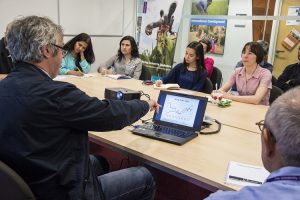Strange but possible: Has increased equality in the US played a role in Trump’s win?
 Professor David Hulme, Executive Director, Global Development Institute
Professor David Hulme, Executive Director, Global Development Institute
Interesting and alarming food for thought? And, yes. You read correctly. Could equality (not inequality and alienation) be the true crux of the matter when it comes to understanding the election of a multi-billionaire, member of the global elite to the White House?
In a refreshing and very alternative argument to the election post mortems of recent weeks, Nora Lustig – an economics professor and Director of the Commitment to Equity Institute at Tulane University – has suggested that perhaps more equality in three key dimensions may be feeding a greater sense of unfairness, indignation, and impotence than the increase in income and wealth inequality in the US.
We’re hiring Research Associates
Bina Agarwal at the Institute of Development Studies
Professor Bina Agarwal recently spoke at the Institute of Development Studies at Sussex University. She discussed the themes from Gender Challenges a three volume publication of essays from over the past 30 years. Professor Agarwal was joined by Professor Melissa Leach, IDS Director to discuss the key and emerging challenges to women empowerment will be. You can watch the discussion in full below.
Completing the AIDS shift? Taming a killer illness
Listen | Is the Islamic State Islamic? An Analysis of its Magazine, Dabiq with Professor Tim Jacoby
The first issue of Dabiq appeared in July 2014, the week after the Islamic State (ad-Dawlah al-Islamiyah – or simply ad-Dawlah to its citizens (Weiss and Hassan, 2015: xi)) captured Syria’s largest oilfield, with the announcement it had re-established the khilafah with the intention of returning Muslims’ ‘dignity, might, rights, and leadership’ (page 7). Since then, 14 more editions have followed in Spanish, German, Russian as well as English, constituting a corpus of 942 pages and over 400,000 words. A number of analyses of its content have now appeared. Some commentators, such as Celine Marie Novenario (2016), have, for instance, compared Dabiq to other militant magazines, while Brandon Colas (forthcoming) and Haroro Ingram (forthcoming) have considered respectively how it fosters its various potential audiences and a sense of in-group identity. While its “religious” content has generally been noted in these (as well as in the burgeoning literature on ad-Dawlah generally (Alexander and Alexander 2015; Gerges (2016); Stern and Berger (2015) etc.)), there are currently no studies seeking to understand Dabiq’s particular approach to Islamic exegeses and how this might connect with wider debates over the relationship between faith and violence. I seek to address this by focusing on three areas of Dabiq’s content (1) its reading of the Qur’an (2) its use of classical scholarship and (3) its engagement with contemporary readings of Islam.
GDI Advent Calendar
 Throughout the month of December we will be running a GDI Advent Calendar to highlight some of the great work carried out by our academics in 2016. Each day we will bring you a different journal article, working paper or book by our researchers.
Throughout the month of December we will be running a GDI Advent Calendar to highlight some of the great work carried out by our academics in 2016. Each day we will bring you a different journal article, working paper or book by our researchers.
At the Global Development Institute we have over 45 academics covering a vast array of research areas. Throughout December we will highlight research covering a range of topics including climate change, migration, institutions and the use of technology in development.
Keep an eye on our Facebook and Twitter accounts for the latest piece of research or check back here where we will be compiling them all.
GDI Lecture Series: The Magic Number: 1.5°C or 2°C Limit on Warming? with Dr Saleemul Huq
On Wednesday, 23 November, Dr Saleemul Huq from International Center for Climate Change and Development, Dhaka discussed The Magic Number: 1.5°C or 2°C Limit on Warming? And what does this actually mean for Least Developed Countries? You can find the video and podcast from the event below. We also asked Saleemul about the election of Donald Trump and its implications upon the Paris Agreement.
Call for papers: Workshop on Rising Powers and Labour Standards in Global Production Networks
The ‘Rising Powers’, especially China, India and Brazil, have now become key players in the global economy. Yet, we still know too little about how these economies are engaging with and potentially shaping, the rules that govern international trade and global production, in particular global labour and social standards. For producers around the world, meeting international standards on social and environmental sustainability is increasingly critical. We are now more aware about the food we eat and how it came to our plates, or whether what we wear implied sweatshop labour. Nonetheless, gains from social compliance – especially for workers and poor producers – remain unclear. Expanding trade between the Rising Power economies, their growing domestic consumer markets and the emergence of leading firms from China, India and Brazil raise questions on how global standards will be shaped in the future, who the key drivers will be, and what implications arise for workers in both these emerging economies and throughout the global economy.
The workshop will be held from 19-20 June 2017 in Manchester.
This workshop will present findings from work undertaken in Brazil, China, India and the EU, as part of an ESRC funded project on labour standards and the governance of global production networks. It also aims to bring together a wider community of academics and practitioners working on labour and sustainability standards in the global economy, but with a particular interest on the ‘Rising Powers’ and how they might sustain, challenge, or change the global discourse on labour and sustainability standards.
Hence, we particularly invite proposals for papers around the following themes:
- The emergence of rising power MNCs, their engagement with CSR and social standards, and the implications for global labour and social standards in global value chains
- The role of innovation, CSR, and human rights in global value chains
- The engagement of civil society actors in the rising powers with local and/or global CSR initiatives and social standards
- Public labour regulation in Brazil, China and India and the engagement of these countries in the international institutions where trade rules on labour and social standards are defined
- The implications of the rise of Brazil, China and India for labour and social standards in OECD and developing economies
Deadlines:
- Abstract submission: 24 February 2017. Please send your abstract (max. 300 words) to khalid.nadvi@manchester.ac.uk andnatalie.langford@manchester.ac.uk
- Full paper submission: 12 May 2017 (max. 8,000 words excl. abstract, notes, references etc.) Papers will be circulated to discussants prior to the workshop.
- Accommodation costs in Manchester will be covered for authors of accepted papers.
Reserve your place for David Hulme’s public lectures in Washington DC
 Professor David Hulme, Executive Director of the Global Development Institute, will be visiting Washington DC at the end of November. Whilst in the United States he will be taking part in three events highlighting his two latest books, ‘Should Rich Nations Help the Poor?’ and ‘Bangladesh Confronts Climate’.
Professor David Hulme, Executive Director of the Global Development Institute, will be visiting Washington DC at the end of November. Whilst in the United States he will be taking part in three events highlighting his two latest books, ‘Should Rich Nations Help the Poor?’ and ‘Bangladesh Confronts Climate’.
Tuesday, 29th November, 12:30 – 2:00 p.m.
Professor David Hulme will be discussing his book ‘Should Rich Nations Help the Poor?’. This informal event will be chaired by Charles Kenny and will include a short introduction to the book followed by a discussion of its arguments. This event will be held at the Center for Global Development. Reserve your place now.
Wednesday, 30th November, 6pm.
David Hulme will be speaking as part of the ‘Colombian Public Policy Perspectives’ lecture series, discussing his book ‘Should Rich Nations Help the Poor?’. This event is open to all but we’re particularly hoping to meet alumni of The University of Manchester. The will be held at The Colombian Embassy. Reserve your ticket.
Thursday, 1st December 12.30-2.00 p.m.
David Hulme will discuss his forth coming book, ‘Bangladesh Confronts Climate Change’, at the World Resources Institute. David will discuss his book with Moushumi Chaudhury from our Climate Resilience Practice followed by a question and answer session with the audience. Book your ticket now.
How the poor borrow
By Stuart Rutherford, Honorary Research Fellow at The Global Development Institute
This is the third in a series of short articles about the findings of a daily ‘financial diary’ research project. A description of the project can be found at its web-site. Details of the poverty levels of our 50 ‘diarists’ can be found in the article on savings listed on the publications page there. In short, they fall into four classes, ranging from extreme poor to near-poor. In this article, we look at the borrowings of our diarists, using daily data for the period from March to October 2016.
A minority of non-borrowers
We have complete daily transaction records for 49 diarist households for that 8-month period, during which 43 of them borrowed, made repayments on borrowings, or (mostly) did both. That leaves six who did not borrow nor repay – so who are they? Our Table shows they are a mixed bunch, not restricted to any specific income level, occupation, or household size. They all save. read more…


